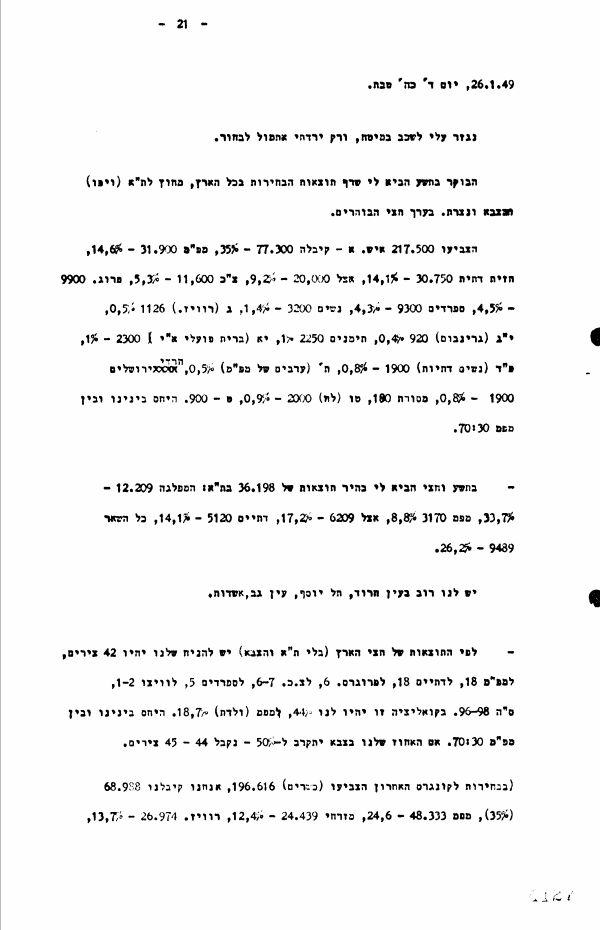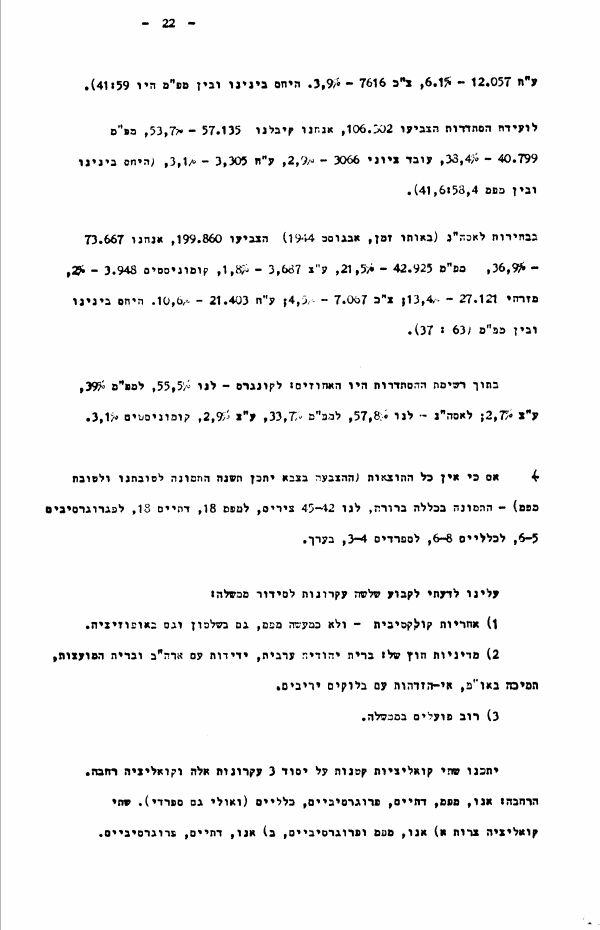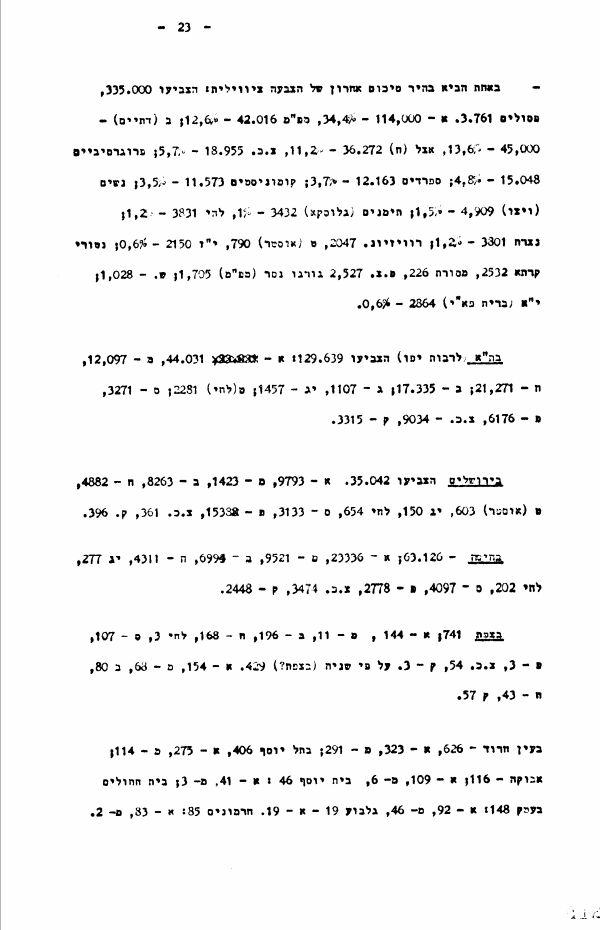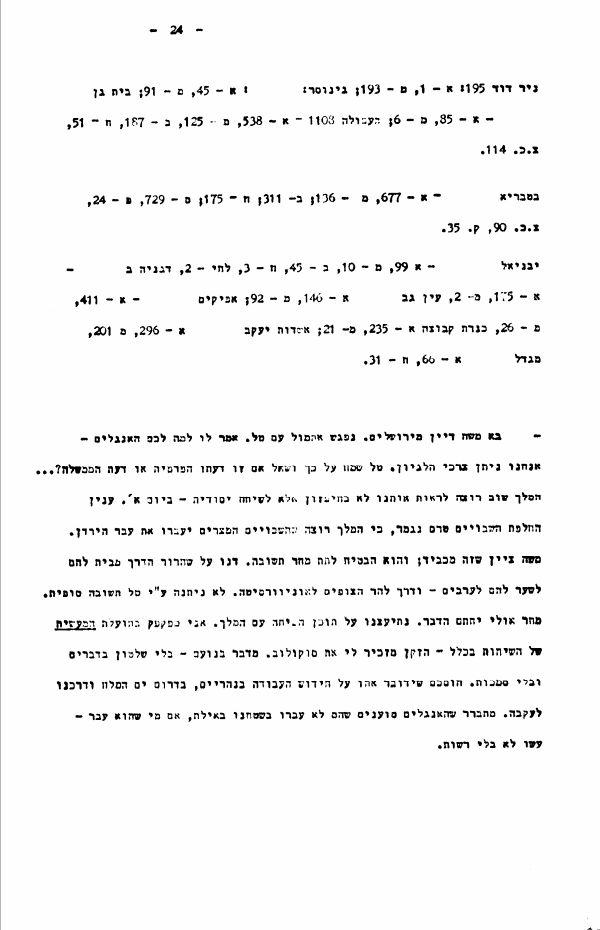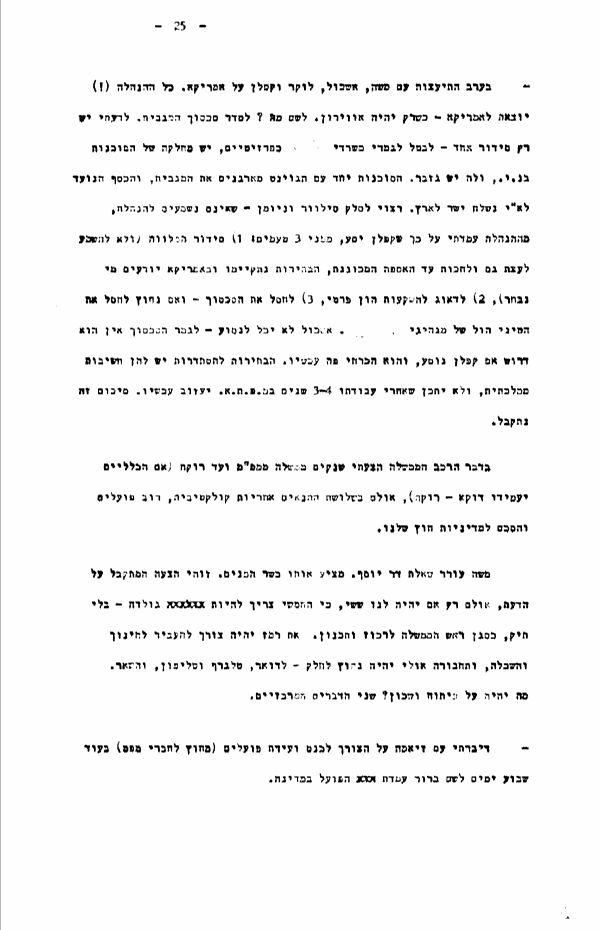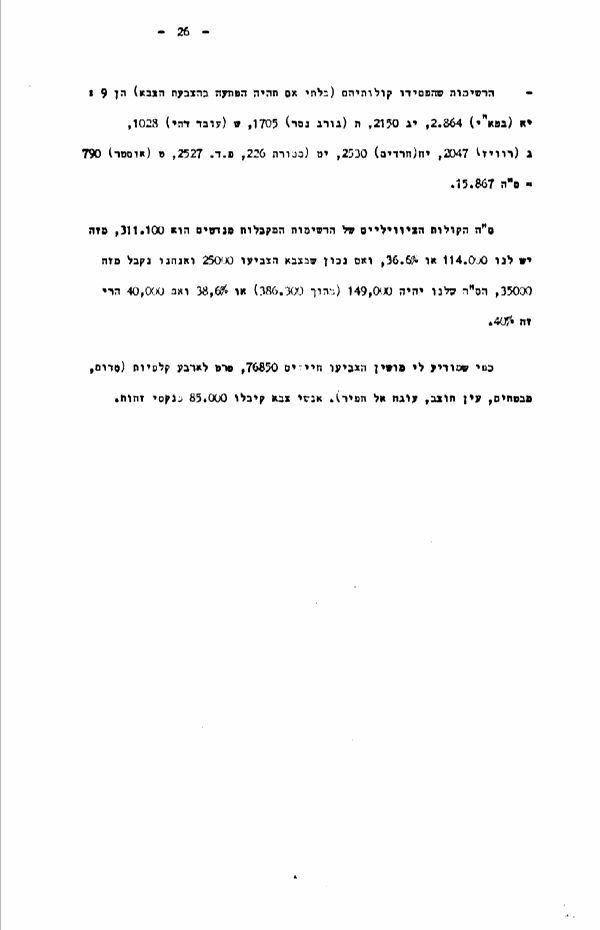Wednesday, January 26, 1949
I was ordered to stay in bed, and I only went out yesterday to vote.
This morning at 9 Sherf brought me the election results for the entire country, excluding Tel Aviv (and Jaffa) and the army and Nazareth. About half the voters.
217,500 people voted. A [Mapai (the letters noted here and below represented the respective parties for voting purposes)] – received 77,300 – 35%, Mapam 31,900 – 14.6%, Religious Front 30,750 – 14.1%, ETZEL 20,000 – 9.2%, G.Z. [General Zionists] 11,600 – 5.3%, Prog. [Progressives] 9,900 – 4.5%, Sephardim 9,300 – 4.3%, Women 3,200 – 1.4%, G (Revis. [Revisionists]) 1,126 – 0.5%, Y.G. (Gruenbaum) 920 – 0.4%, Yemenites 2,250 – 1%, YA (Brit Po’alei Eretz Israel) 2,300 – 1%, P.D. (Religious Women) 1,900 – 0.8%, Th (Mapam Arabs) 0.5%, Jerusalem Haredim [Ultra-Orthodox] 1,900 – 0.8%, Massoret 180, TV (LEH [LEHI, i.e., the Fighters’ List (former LEHI members)]) 2,000 – 0.9%, T – 900. The ratio between us and Mapam is 70:30.
– At 9:30 Bahir brought me the results of 36,198 in Tel Aviv: the party 12,209 – 33.7%, Mapam 3,170 – 8.8%, ETZEL 6,209 – 17.2%, Religious 5,120 – 14.1%. All the rest 9,489 – 26.2%.
We have a majority in ‘Ein Harod, Tel Yosef, ‘Ein Gev, Ashdot.
– Based on the results of half the country (excluding Tel Aviv and the army) we can expect to have 42 delegates, Mapam 18, the Religious 18, the Progress[ives] 6, the G.Z. 6-7, the Sephardim 5, WIZO 1-2, total 96-98. In this coalition we’ll have 44%, Mapam (and the Religious) 18.7%. The ratio between us and Mapam is 70:30. If our percentage in the army approaches 50% – we’ll have 44-45 delegates.
In the elections to the last [Zionist] Congress, 196,616 voted (valid votes); we received 68,988 (35%), Mapam 48,333 – 24.6, Mizrachi 24,439 – 12.4%, Revis. 26,974 – 13.7%, A.H. [Aliya Hadasha] 12,057 – 6.1%, G.Z. 7,616 – 3.9%. The ratio between us and Mapam was 59:41.
For the Histadrut conference 106,302 voted; we received 57,135 – 53.7%, Mapam 40,799 – 38.4%, Oved Zioni [Zionist Worker] 3,066 – 2.9%, A.H. 3,306 – 3.1% (the ratio between us and Mapam was 58.4:41.6).
In the elections to Asefat HaNivharim [the Assembly of Representatives] (at the same time, August 1944) 199,860 voted. We [received] 73,667 – 36.9%, Mapam 42,925 – 21.5%, O.Z. [Oved Zioni (Zionist Worker)] 3,687 – 1.8%, Communists 3,948 – 2%, Mizrachi 27,121 – 13.4%; G.Z. 7,067 – 4.5%; A.H. 21,403 – 10.6%. The ratio between us and Mapam (63:37).
Within the Histadrut list the percentages were: To the Congress – for us 55.5%, for Mapam 39%, O.Z. 2.7%; To Asefat HaNivharim – for us 57.8%, for Mapam 33.7% O.Z. 2.9%, Communists 3.1%.
Although not all the results have come in (the voting in the army might change the picture in our favor and in Mapam’s favor) – the overall picture is clear; we have 42-45 delegates, Mapam 18, Religious 18, the Progressives 5-6, the General [Zionists] 6-8, the Sephardim 3-4, approximately.
We must, in my opinion, establish three principles in setting up the government:
- Collective responsibility – and not as Mapam has done – both in the government and in the opposition.
- A foreign policy of: Jewish-Arab alliance, friendship with the US and the Soviet Union, support for the UN, non-alignment with rival blocs.
- A labor majority in the government.
It’s possible that there will be two small coalitions based on these 3 principles, or a broad coalition. The broad one: us [Mapai], Mapam, the Religious, Progressives, General [Zionists] (and maybe also Sephardi[m]). Two narrow coalitions[:] A) Us, Mapam, Progressives. B) Us, Religious, Progressives.
– At 1 Bahir brought the final tally of civilian voting: 335,000 voted, 3,761 invalid. A [Mapai] – 114,000 – 34.4%, Mapam 42,016 – 12.6%; B (Religious) 45,000 – 13.6%, ETZEL (H) 36,272 – 11.2%, G.Z. 18,955 – 5.7%; Progressives 15,048 – 4.8%; Sephardim 12,163 – 3.7%; Communists 11,573 – 3.5%; Women (WIZO) 4,909 – 1.5%; Yemenites (Glosca) 3,432 – 1%, LEHI 3,831 – 1.2%, Nazareth 3,801 – 1.2%; Revision[ists] 2047, T (Auster) 790, Y.Z. 2,150 – 0.6%; Neturei Karta 2,532, Massoret 226, P.Z. 2,527, George Nasser [sp.] (Mapam) 1,705; Sh. – 1,028; Y.A. (Brit PEI [Po’alei Eretz Israel]) 2,865 – 0.6%.
In Tel Aviv (including Jaffa) 129,639 voted: A – 44,031, M – 12,097, H – 21,271; B – 17,335; G – 1,107; YG – 1,457; T (LEHI) 2,281; S – 3,271, P – 6,176, G.Z. – 9,034, K – 3,315.
In Jerusalem 35,042 voted. A – 9,793, M – 1,423, B – 8,263, H – 4,882, T (Auster) 603, YG 150, LEHI 654, S – 3,133, P – 1,538, G.Z. – 261, K. – 396.
In Haifa – 63,126; A – 23,336; M – 9,521, B – 6,994, H – 4,311, YG 227, LEHI 202, S – 4,097, P – 2,778, G.Z. 3474, K – 2,448.
In Safed 741; A – 144, M – 11, B – 196, H – 168, LEHI 3, S – 107, P – 3, G.Z. 54, K – 3. According to a second [count?] (in Safed?) 429. A – 154, M – 68, B 80, H – 43, K 57.
In ‘Ein Harod – 626, A – 323, M – 291; in Tel Yosef 406, A – 275, M – 114; Avuka – 116; A – 109, M – 6, Bet Yosef 46: A – 41, M – 3; the hospital in the Valley 148: A – 92, M – 46, Gilboa 19 – A – 19. Harmonim 85: A – 83, M – 2.
Nir David 195: A – 1, M – 193; Ginnosar: A – 45, M – 91; Bet Gan – A – 85, M – 6; ‘Afula 1,103 – A – 538, M – 125, B – 187, H – 51, G.Z. 114.
In Tiberias – A – 677, M – 136; B – 311; H – 175; S – 729, P – 24, G.Z. 90, K. 35.
Yavne’el – A 99, M – 10, B – 45, H – 3, LEHI – 2, Degania Bet – A – 175, M – 2, ‘Ein Gev A – 146, M – 92; Afikim – A – 411, M – 26, Kinneret Kvutza A – 235, M – 21; Ashdot Ya’akov A – 296, M 201, Migdal A – 66, H – 31.
– Moshe Dayan arrived from Jerusalem. [He] met with Tall yesterday. Told him: Why do you need the English – we’ll supply the Legion’s needs. Tall was happy to hear this and asked whether it was his personal view or the government’s view. The king wants to see us again, not hastily but for an in-depth discussion – on Sunday [January 30]. The matter of a prisoners’ exchange hasn’t been settled yet, because the king wants the Egyptian POWs to transit through Transjordan. Moshe noted that this is burdensome, and he promised to give an answer tomorrow. They discussed freeing up the road from Bethlehem to Lehem [i.e., Jaffa?] Gate for Arabs – and the road to Mount Scopus and the University. I haven’t provided a final answer yet. It might be signed tomorrow. We consulted on the subject matter of the conversation with the king. I questioned the practical value of the talks in general – the old man reminds me of [Nahum] Sokolov. He speaks pleasantly – without having control over things and without authority. It was agreed that [they] would speak with him about resuming work in Naharayim, the southern Dead Sea, and our passage to ‘Aqaba [the Gulf of Eilat]. It turns out that the English are claiming that they hadn’t passed through our territory in Eilat, and if somebody did – they did so without permission.
In the evening a consultation with Moshe [Sharett], [Levi] Eshkol, [Berl] Locker, and [Eliezer] Kaplan regarding America. The entire Executive (!) is leaving for America – as soon as an airplane is ready. For what? To sort out the UJA issue. In my view there’s only one arrangement – to completely dismantle the offices of the U.P.A. as they’re parasites. There’s a [Jewish] Agency department in New York, and it has a treasurer. The Agency along with the Joint [Distribution Committee] organize the fundraising campaign, and the money intended for Eretz Israel is sent directly to the country. [Abba Hillel] Silver and [Emanuel] Neumann – who do not listen to the Executive – should be expelled from the Executive. I insisted that Kaplan go, for three reasons: 1) To sort out the [American] loan (and not to take [Oscar] Gass’s advice and wait for the Constituent Assembly; the elections have taken place, and in America it’s known who was elected). 2) To pursue private capital investments. 3) To crush the conflict – and if necessary, to crush the “Tammany Hall” of the ZOA leaders. Eshkol cannot go. He’s not needed in order to settle the conflict if Kaplan is going, and it’s imperative to have him here now. The [upcoming] elections to the Histadrut are important at the state level, and it’s inconceivable that after working 3-4 years in the Tel Aviv workers’ council, he would leave now. This conclusion was accepted.
Regarding the government composition, I proposed that we form a government from Mapam up to [Israel] Rokach (if the General [Zionists] specifically put Rokach forward), but on three conditions: collective responsibility, a labor majority, and acceptance of our foreign policy.
Moshe raised the question of Dr. Yosef. He proposes him as minister of the interior. This proposal is acceptable, but only if we have a sixth, because the fifth should be Golda – without a portfolio, as deputy prime minister for coordination and planning. Remez will have to be shifted to education, and transport rights need to be divided – into postal service, telegraph, and telephone, etc. What about development and housing? The two main issues.
– I spoke with Ziama about the need to convene a labor conference (aside from Mapam members) in a week to discuss the status of the worker in the state.
– The lists [voting tickets] that lost their votes (unless there’s a surprise from the voting in the army) are 9: YA (BPEI) 2,864, YG 2,150, Th. (George Nasser) 1,705, Sh. (Religious Worker) 1,028, G (Revis[ionists]) 2,047, YH (Haredim) 2,530, YT (Massoret) 226, P.D. 2,527, T (Auster) 790 – total 15,867.
The total number of civilian votes receiving mandates is 311,100, of which we have 114,000 or 36.6%, and if it’s true that 25,000 voted in the army and we receive 35,000 of this, then our total is 149,000 (out of 386,300), or 38.6%, and if 40,000 then 40%.
According to what Mushin told me, 76,850 soldiers voted, aside from four polling stations (Sdom, Mivtahim, ‘Ein Husub, ‘Auja al-Hafir). Army personnel received 85,000 ID cards.





